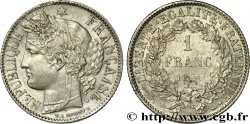正面
正面的文字 REPUBLIQUE - FRANÇAISE..
正面的说明书 Tête de Cérès à gauche, surmontée d'une étoile, coiffée d'une couronne d'épis, de feuilles de chêne et d'olivier, avec un bandeau inscrit CONCOR ; signé E.A. OUDINÉ. F. au-dessous.
背面
背面的文字 (FEUILLE DE CHÊNE) LIBERTE. EGALITE. FRATERNITE. 2/ FRANCS/ 1849/ A.
背面的说明书 dans une couronne composite d'olivier et de chêne.
历史细节
II REPUBLIC
(02/24/1848-12/2/1852)
During the February 1848 revolution, Louis-Philippe abdicated in favor of his grandson, but the latter was not recognized by the Chambers and, on February 24, the Republic was proclaimed by a decree of the provisional government.. He proclaimed the freedom of work, the abolition of the death penalty in political matters, universal suffrage. The national workshops were created in March 1848. Elections are held in April and result in the success of moderate Republicans. The closing of the national workshops causes riots which are bloodily repressed by General Cavaignac who is appointed chairman of the council. The rebels are executed, imprisoned, deported. Legislative power is entrusted to a single assembly while the President of the Republic, elected by universal suffrage, holds the executive. The latter is Prince Louis Napoleon. He came into conflict with the assembly in 1850 because his re-election was unconstitutional.. Louis Napoleon then engages in the preparation of the coup d'etat which allows him, on December 2, 1851, to install his dictatorship. In November 1852, it was proposed to restore the hereditary imperial dignity. The plebiscite of November 21-22 gives nearly eight million yes for the Empire while the no collected only about 250. 000 votes. On December 2, 1852, Louis Napoleon was proclaimed emperor under the name of Napoleon III..








 对产品描述纠错
对产品描述纠错 打印
打印 分享我的选择
分享我的选择 提问
提问 Consign / sell
Consign / sell
 产品介绍
产品介绍









